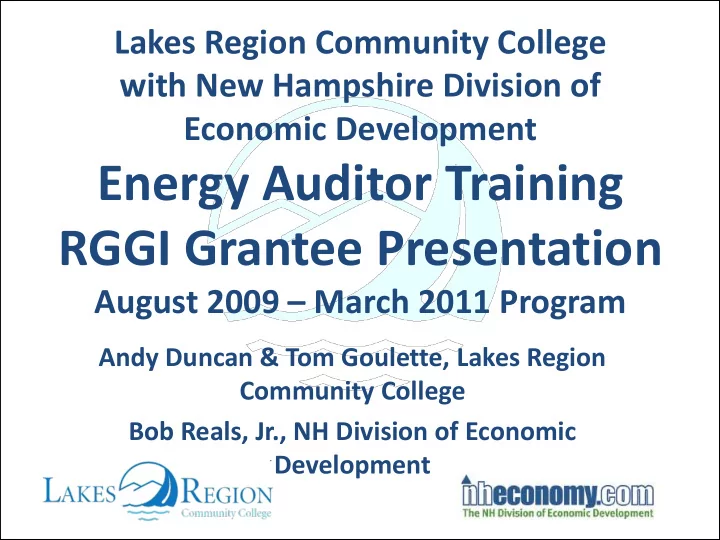

Lakes Region Community College with New Hampshire Division of Economic Development Energy Auditor Training RGGI Grantee Presentation August 2009 – March 2011 Program Andy Duncan & Tom Goulette, Lakes Region Community College Bob Reals, Jr., NH Division of Economic Development
Overall Program & Purpose • Official Title: “Expanded Energy Efficiency and Renewable Energy Program” • Working Title: “Energy Auditor Training Program” – Goal : “To increase the number of trained energy auditor contractors in the NH workforce” • $174,000 in total RGGI funding over 1 ½ years – Through NH Division of Economic Development – $168,500 to Lakes Region Community College – Reduced tuition costs for students 2
Training Leading to BPI Certification • Building Performance Institute (BPI) www.bpi.org – Nationally recognized certifications – Focus on existing residential buildings – Multiple certifications – Rigorous examination & recertification process • BPI emphasis on health & safety, building durability as well as energy efficiency – Combustion safety – Reducing interior moisture problems – “Seal tight and ventilate right” 3
Energy Auditor Training: BPI “Building Analyst” Course • Intensive 6+ day training – Contact hours similar to 3 credit college course – About half instruction in the field • Leading to BPI certification exams – 100 question written exam + 2 hour field exam Jan. 2010 class at HBRANH BPI field exam -- proctor & student 4
Components of a Building Analyst Energy Audit Blower door air leakage test Visual assessment Minimum Building Airflow CFM 50 = 0.35 * volume * N hc 60 Field calculations Carbon monoxide & combustion safety tests 5
Additional Trainings Offered • BPI “Envelope Professional” • “TREAT Energy Modeling” – Sample TREAT report graphic → • “Insulation & Air Sealing Muddy Boots Workshop” (through PAREI) • “Infrared for Weatherization and Energy Audits” – Exterior infrared image with uninsulated basement → 6
Training Classroom Locations Laconia (6) Concord (5) Nashua (2) Plymouth (2) Littleton Portsmouth Lebanon 7
Student Characteristics • Overall: – Average age ~45 – Over 90% male – Typically homeowners • Common student types – Energy professional seeking BPI credentials – Remodeler/carpenter gaining building science skills – Other professional career changer – Unemployed / student 8
Students from throughout New Hampshire 9
Volunteer Houses • Crucial to the success of the course – Time consuming logistics • Students sleuthing a house in return for free diagnostic tests • Over 90 houses used – A weatherization training center would facilitate instruction • Energy savings – In volunteer’s homes – In student’s homes 10
Alliances with Other Organizations Including: • NH Colleges – White Mountains Community College, Nashua Community College, Great Bay Community College, Lebanon College, Southern NH University • Not-for-profit Organizations – Home Builders & Remodelers Assn. of NH (HBRANH), Plymouth Area Renewable Energy Initiative (PAREI), Sustainable Energy Resource Group (SERG), Society for Protection of NH Forests (SPNHF) • All Major NH Energy Utilities • NH Office of Employment Security 11
Training Outcomes • 222 total students in 18 courses – 151 BPI certified out of 176 taking BPI exams – From 80 NH municipalities • August 2010 alumni survey results – 8.5% became employed in the energy field – 10% started a new energy business – 20% started a new line of work or attracted new customers – 38% increased their skills in existing jobs • Developing the building energy performance field – Higher standards and more professionalism – Green collar jobs, saving energy & reducing fossil fuel use 12
Student Stories: Shad from Sugar Hill, NH • Took Fall 2009 Building Analyst in Littleton • With classmate formed a successful energy auditing and contracting company 13
Student Stories: Bill from Loudon, NH • Took January 2010 Building Analyst course and two additional trainings in 2011 • Expanded a building/remodeling company into weatherization contracting – Hired 4 underemployed framers 14
2 nd Round 2011 – 2012 Efficiency Training Program • Continues and expands on 1 st round program – Adds Plymouth Area Renewable Energy Initiative (PAREI) as a supporting partner • Components include: – Wider audience- building energy professionals, allied professionals and advanced DIY’ers – More weatherization installer trainings – Mentoring program – Equipment rental program – Collaborating with additional organizations 15
Conclusion • Successful energy auditor training program • BPI certification has created additional professional credibility • Ongoing Efficiency Training Program is building from this successful foundation • Contact information: – Andy Duncan, Lakes Region Community College aduncan@ccsnh.edu, tel. 603-524-3207 – Bob Reals, Jr., NH Division of Economic Development bob.reals@dred.state.nh.us, tel. 603-271-2341 16
Recommend
More recommend